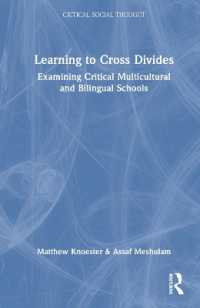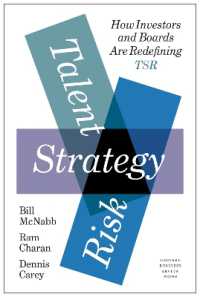- ホーム
- > 洋書
- > 英文書
- > Science / Mathematics
Full Description
As a general rule any interdisciplinary subject and that includes Computational Theoretical Organic Chemistry (CTOC) incorporates people from the two overlaping areas. In this case the overlaping areas are Computational Theoretical Chemistry and Organic Chemistry. Since CTOC is a relatively young science, people continue to shift from their major discipline to this area. At this particular time in history we have to accept in CTOC people who were trained in Computational Theoretical Chemistry and do not know very much about Organic Chemistry, but more often the opposite case is operative Experimental Organic Chemistry who have not been exposed to Computational Theoretical Chemistry. This situation made NATO Advanced Study Institute in the field of CTOC necessary. The inhomogenity outlined above was present in the NATO Advanced Study Institute, held at Menton in July 1980, and to some degree it is noticable from the content of this volume. This book contains 20 contributions. The first contribution is an Introduc tion chapter in which the initiated experimental chemists are briefed about the subject matter. The last chapter describes very briefly the "Computational Laboratory" that was designed to help people with an experimental back ground in order to obtain some first hand experience. Between the first and the last chapters there are 18 contributions. These contributions were arranged in a spectrum from the exclusively method oriented papers to the applications of existing computational methods to problems of interest in Organic Chemistry.
Contents
Some Fundamentals of Computational Theoretical Chemistry.- Gaussian Basis Sets.- Single- and Multi-configuration Self Consistent Field Methods.- Development of a Computational Strategy in Electronic Structure Calculations: Error Analysis in Configuration Interaction Treatments.- The Configuration Interaction Method.- Optimization and Analysis of Energy Hypersurfaces.- Ab Initio Energy Derivatives Calculated Analytically.- Analytic Energy Gradients for Open-Shell Restricted-Hartree-Fock, Limited Multi-configuration SCF, and Large Scale Configuration Interaction Wavefunctions.- An Internal Invariant Reaction Pathway by the Acceleration Method.- A Numerical Approach for Finding Stationary Points and for Computing Force Constant Matrices: The Experimental Designs in Local Analytical Surfaces. Application to the Vibrational and to the Thermodynamical Analysis.- Quantitative Orbital Analysis of Structural Problems at the Ab-Initio SCF-MO Level.- Perturbational Molecular Orbital Analysis.- Structure and Properties of Free-Radicals. A Theoretical Contribution.- Triplet Oxiranes: Application of Quantum Mechanical Methods to the Study of the Reactions of Triplet Isomeric Oxiranes.- Rotational Barriers in Vinyl Compounds.- Theoretical Asoects of Small Molecule Rydberg Photochemistry.- Out-of-Plane Bending Coordinates for Tetraatomic Molecules.- Theoretical Studies on Zeolite Composition and Loewenstein's Rule.- Solvent Effects — Excited State Dipole Moments.- Computational Laboratory Projects.- Index of Subject.








